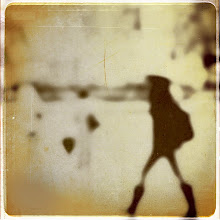Ca modus operandi, te aștepți la două lucruri de la
un album Nick Cave: fie un perfect personalizat hedonism gălăgios și sîngeros,
unde nebunia muzicală hardcore, morbiditatea excesivă și poezia perversă a
versului își au rolul lor atent
calculat, fie o lirică baladescă mult mai cuminte, deși la fel de conceptuală
și pretențioasă în execuție. Push the Sky Away nu se încadrează în niciuna. La
o primă ascultare, ești tentat să-l acuzi că și-a întors parcă un pic prea mult
obrazul către muzica amorfă de ambient și atmosferă, de o simplitate aproape
embrionică. Desigur, genul acesta de ”diluare” muzicală la care Cave simte
nevoia de a se deda ca să mai omoare timpul între orgiile sale frenetice nu e
nouă. Bob Dylan (în perioada lui ”creștină”) și Leonard Cohen (circa I’m your
man), luînd împreună o supradoză de amfetamine într-un bordel sordid, în timp
ce trec din mînă paralizată în mînă paralizată o copie terfelită după John
Donne. Cam asta era atmosfera.
Dacă ai însă răbdare să mai asculți albumul o dată,
îți dai seama că piesele n-au nici melancolia forțată a baladelor de altădată
și nu-s nici iremediabil scufundate într-o atmosferă de artă serioasă,
intelectuală, care merită consumată ca sunet de background și atît. Nu-i nici
măcar o combinație între cele două. Primul album compus fără Mick Harvey,
membru fondator the Bad Seeds, îi găsește pe Cave, Warren Ellis, Marty Casey și
Jim Sclavunos explorînd o gamă nouă și mult mai largă de sunete și texturi,
lucru pe care nu l-au mai făcut pînă acum. Dacă pînă nu demult chitara
coșmarescă a lui Harvey avea rolul principal, în Push the Sky Away
dăm de sunete tîrșîite de vioară, flaut și pian, de o grație care, tocmai pentru că-i sublimată, dă pieselor un cu totul alt gen de
autoritate.
Asta fără să mai punem la socoteală narativul
impecabil, care atinge noi și teribil de fertile înălțimi discursive. Bine, Nick Cave le-a avut întotdeauna mai
degrabă cu vorbele, decît cu notele. El însuși o recunoștea. ”Mi-e mult mai
ușor să scriu versuri, să scriu în general. Ca muzician, m-am simțit
întotdeauna un impostor. Multă vreme m-am învinovățit că nu abordez piesele din
punct de vedere muzical, ci mai degrabă narativ. Cred că asta face ca the Bad
Seeds să fie iremediabil irelevantă în peisajul muzical contemporan. Dar nu
contează, ăsta e șarmul nostru primar.” Diferența
e că, dacă pînă acum piesele sale ”împrumutau” teme din Dostoievski, WH Auden,
Shakespeare și Flannery O’Connor, aici te lovești de aluzii la google,
Wikipedia [”Wikipedia is heaven/When you don’t want to remember”] și Hannah
Montana. Îmbrățișînd atît hiperrealitatea personală, cît și pe cea
contemporană, Push the Sky Away este în același timp și cel mai tradițional,
dar și cel mai modern album Nick Cave. Pentru prima dată rămîi cu impresia
aproape palpabilă că ți se vorbește mai mult despre Cave-omul, decît despre
Cave-personajul – slăbănogul cu păr vopsit și față lungă, gol pușcă și priapic,
călărind un babuin, după cum l-a reinterpretat Krent Able în celebra ilustrație
Dr. Cave.
Și ți se vorbește cursiv, fiecare piesă fiind un
episod ce-și are bine poziționat locul într-un album al cărui schelet seamănă
bine de tot cu un scenariu. După două coloane sonore excepționale, realizate
împreună cu Warren Ellis (pentru The Proposition și The Road), și un sequel
pentru The Gladiator (al cărui sinopsis sună a nebunie frumoasă: în viața de
apoi, Maximus se încurcă cu zeii romani, se reîncarnează, apără creștinii, se
reunește cu fiul său, cîștigă viață eternă și apare în cel de-al doilea război
mondial pe post de șofer de tanc; lui Crowe și lui Ridley Scott le-a plăcut,
dar studioul nu s-a omorît după el), nu-i de mirare că se întîmplă asta. ”Îl
știu de cînd eram amîndoi puști”, spune Warren Ellis. ”Eu îl ajutam cu muzica,
el mă ajuta cu filmele. Eu iubesc muzica și m-am implicat în chestia asta de-a
lungul întregii mele cariere, iar Nick adoră filmele. El se uită la mai multe
filme decît mine, iar eu ascult mai multă muzică decît el. E o legătură
ciudată, dar funcționăm.”
Îmi plăcea de Cave și înainte, pentru că avea
curajul să se ia la trîntă cu chestii grele și chestia asta mă făcea să-l
apropii oarecum de Johnny Cash. Singurul minus era tendința de a supraîncărca
fiecare vers, atît muzical, cît și verbal, problemă pe care Johnny Cash nu a
avut-o niciodată. Push the Sky Away face exact asta, mai dă jos din greutățile
mai mult sau mai puțin artificiale, adăugînd în același timp un pic mai multă
lumină, ceva mai mult loc de respirație. Spunea într-un interviu că ar trebui
să scrii la persoana a treia ca să poți să vorbești despre ceea ce simți fără
să simți. Cred că asta face diferența, faptul că-și asumă intimitatea persoanei
întîi și-și descrie murdăria și alienarea curat, asumat [I’m transforming/I’m vibrating/I am an embryo eating
dark oxygen/I’m glowing/I’m flying/Look at me now].
Dacă ar trebui să
folosesc mult prea uzitata paralelă cu albumul care-i copilul artistului, lucru
pe care l-a făcut și Cave, asemănînd Push the Sky Away cu ”bebelușul fantomă
care bîntuie noaptea prin incubatoare”, eu aș spune că ce se întîmplă aici
seamănă teribil de mult cu scenariul din The Curious Case of Benjamin Button.
Ăsta mic s-a născut bătrîn, anchilozat, ridat și lamentat, dar, cumva, innocent
și pur, oricît de contraintuitivă ar părea alăturarea asta de termeni cînd te
referi la un album Nick Cave. Să-ți alegi copilul preferat e o alegere
imposibilă, dar Push the Sky Away este frățiorul slab și bolnav al familiei, pe
care nu te poți abține să nu-l iubești.












